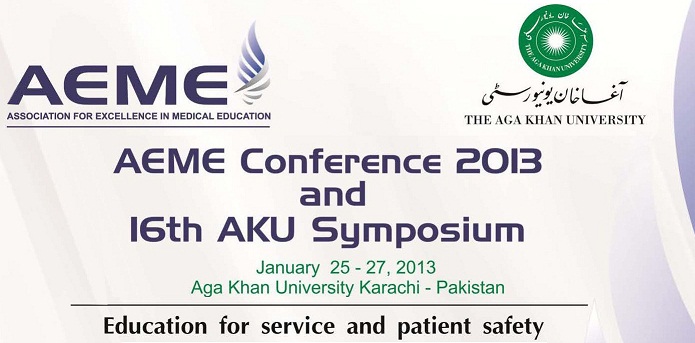Day 1 : Oral Presentations (Theme: Education for Service)
Promoting maternal neonatal and child health (MNCH): offering MNCH/RH (reproductive health) track in Masters of Science in Public Health (MSPH) program at Health Services Academy
Location
Lecture Hall 3
Start Date
26-1-2013 11:25 AM
Abstract
Background: Pakistan is among countries which are clearly off track for their progress towards achieving MDGs 4 and 5 by 2015. A recent report by the Partnership for Maternal, Neonatal and Child Health, places Pakistan among the 49 Global Strategy priority countries which require additional support for Women’s and Children’s Health, through enhanced financing, strengthened policy and improved service delivery. Cognizant of the needs of the country’s human resource in health, the Health Services Academy, a public health institute, developed an MNCH/RH track for the graduate students of its Masters in Public Health Program.
Methods: A desk-review of the country’s needs with reference to its extant health systems was carried out to identify priority areas in the field of MNCH/RH. The exhaustive list was then prioritized/and trimmed, given the logistic and time constraints. The MNCH Department was supported for short term capacity building trainings at reputable International Universities. Subsequent to their trainings, they were required to develop/adapt elective courses for the Master’s students. The developed courses were revised in consultation with the national and international subject experts. The courses were then offered as short courses and further refined based on the facilitators’ and participants’ feedback
Results: Altogether four, three-credit-hour each, courses were developed, namely; i) Community-based Reproductive Health Interventions, ii)Childhood Studies-Research and Ethics, iii) Gender and Reproductive Health and iv) Analytic Skills for Development of Programs and Policies for Reproductive Health. All the courses had a strong practical component allowing the students to get hands on training in the respective subjects.
Conclusions: By imparting skills and techniques to analyze MNCH/RH issues the MNCH/RH track will contribute towards developing the capacity of health -workforce working in MNCH.
Key words: Public health, Reproductive health, Health workforce
Promoting maternal neonatal and child health (MNCH): offering MNCH/RH (reproductive health) track in Masters of Science in Public Health (MSPH) program at Health Services Academy
Lecture Hall 3
Background: Pakistan is among countries which are clearly off track for their progress towards achieving MDGs 4 and 5 by 2015. A recent report by the Partnership for Maternal, Neonatal and Child Health, places Pakistan among the 49 Global Strategy priority countries which require additional support for Women’s and Children’s Health, through enhanced financing, strengthened policy and improved service delivery. Cognizant of the needs of the country’s human resource in health, the Health Services Academy, a public health institute, developed an MNCH/RH track for the graduate students of its Masters in Public Health Program.
Methods: A desk-review of the country’s needs with reference to its extant health systems was carried out to identify priority areas in the field of MNCH/RH. The exhaustive list was then prioritized/and trimmed, given the logistic and time constraints. The MNCH Department was supported for short term capacity building trainings at reputable International Universities. Subsequent to their trainings, they were required to develop/adapt elective courses for the Master’s students. The developed courses were revised in consultation with the national and international subject experts. The courses were then offered as short courses and further refined based on the facilitators’ and participants’ feedback
Results: Altogether four, three-credit-hour each, courses were developed, namely; i) Community-based Reproductive Health Interventions, ii)Childhood Studies-Research and Ethics, iii) Gender and Reproductive Health and iv) Analytic Skills for Development of Programs and Policies for Reproductive Health. All the courses had a strong practical component allowing the students to get hands on training in the respective subjects.
Conclusions: By imparting skills and techniques to analyze MNCH/RH issues the MNCH/RH track will contribute towards developing the capacity of health -workforce working in MNCH.
Key words: Public health, Reproductive health, Health workforce

